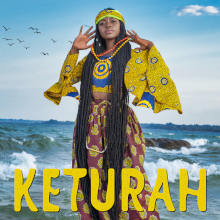The Graham Album Review #2156

Click on CD Cover for Audio Review in streaming mp3 format | |
Keturah: Keturah
(Henhouse Studios, as broadcast on WVIA-FM 5/31/2023)

Click on CD Cover for Audio Review in streaming mp3 format | |
Keturah: Keturah
(Henhouse Studios, as broadcast on WVIA-FM 5/31/2023)
Over the last couple of decades, the world music scene has brought forth of a lot of interesting and quite-appealing music. With the internet allowing anyone anywhere to hear styles from other places, this has been a prolific time for influence mixing, with seemingly disparate styles and cultures regularly coming together. And to me, some of the most engaging music has been coming from Africa, with styles that encompass African folk blending with western pop influence. This week, we have a great example of that. It’s the eponymous debut album by composer and vocalist Ketura. It’s a wonderful combination of different African styles, with a number of American musicians.
Ketura is a 27-year old from Malawi, a small landlocked country in southeastern Africa, not far from South Africa with its rich musical scene, and Democratic Republic of Congo the source of the eminently danceable soukous or African rumba style.
Ketura, who goes by the single name, has a fascinating story, a journey which took her from a village in Malawi to record in Los Angeles with some notable figures in the music world. As a child, Ketura would often go with her uncle on walks through their village, in which he would sing and play guitar. With her interest in music, Ketura would often keep to herself, sometimes thinking of herself as an outcast. By age 13, both her uncle and mother, whom she was very close to, had passed away. She was determined to keep the music alive, and decided to walk to the Malawian city of Blantyre, in search of a recording studio to make her music. She eventually caught the eye of Luc Deschamps, who leads the Jacaranda Foundation which runs a school for children orphaned by AIDS. Deschamps knew Harlan Steinberger, a producer in Los Angeles, known for his cross-cultural work. The Jacaranda Foundation arranged to fly Keturah to Los Angeles to record. Prior to that, she had never left Malawi of even flown in a plane.
In L.A., Steinberger assembled a diverse cast of musicians, including Mark Johnson, the producer known for the Playing for Change global cross-cultural projects, Malian kora player Prince Diabate, Willie Nelson’s long-time harmonica player Mickey Raphael, bassist Kaveh Rastegar, who has recorded with John Legend and Bruno Mars, and John Densmore, the drummer from the 60s band the Doors, playing some percussion. They add interesting textures to Keturah’s melodic, but sometimes melancholy songs, which bring the tuneful quality of South African pop with the rippling rhythms of Congolese soukous, with the instrumental textures of the West African kora harp-guitar.
Opening is a piece called Ku Nyumba which epitomizes the delightful blend of the melodic quality of South African pop with the Congolese rumba-influenced soukous rhythms with the high-register guitar figures played by Jason Tamba from the Playing for Change band. <<>>
With a more melancholy texture is a track called Mvula. The piece is simple in structure but Keturah’s plaintive vocals make it memorable. <<>>
A track called Kwanumkwanu also shows its South African influence, and features a few phrases in English. The Doors’ John Densmore provides some of the percussion. <<>>
About the most unlikely track on the album is Nchiwewe whose subtitle is Ode to Willie Nelson with the African folk influence juxtaposed with a country style waltz, with the help of Willie Nelson’s harmonica player Mickey Raphael. <<>>
The one piece on the album with a title in English is called All the Way from Africa though it is bilingual. In its style, it’s more or less straight out Congolese soukous and thoroughly danceable and appealing. <<>>
Another interesting bit of eclecticism comes on a piece called Udzafele Zina. The track draws on South African pop elements, but with a Dixieland style trumpet blaring out. <<>>
Chimbalame is another distinctive blend, with a kind of classic African 6/8 rhythm, with a prominent appearance by kora player Prince Diabate. <<>>
The album ends with Wewe which adds another bit of appealing eclecticism – a mixture of a funky guitar line, a jazzy piano and Latin style percussion. <<>>
Keturah the debut album by Malawian singer-songwriter Keturah is a recording that is both fascinating for its musical mixtures, and thoroughly appealing. Keturah is a personable vocalist with a fairly wide range, from joyful to melancholy, and songs reflect that. The one thing that is notably missing from physical CD package is a translation of the lyrics.
Our grade for audio quality is close to an “A” with a clean sound and a dearth of unnecessary effects.
The world music scene continues to be a source of engaging and in a way refreshing music, compared the cliches of commercial pop. Keturah’s eponymous debut album is a shining example of that.
(c) Copyright 2023 George D. Graham. All rights reserved.
This review may not be copied to another Web site without written permission.
 To Index of Album Reviews | To George Graham's Home Page. | What's New on This Site.
To Index of Album Reviews | To George Graham's Home Page. | What's New on This Site.